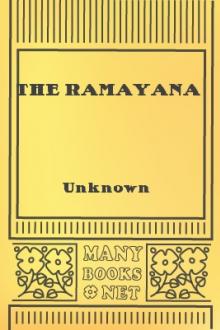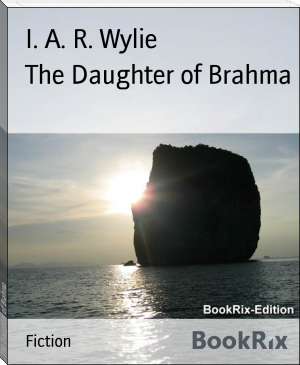The Ramayana - Valmiki (best ereader for epub txt) 📗

- Author: Valmiki
- Performer: -
Book online «The Ramayana - Valmiki (best ereader for epub txt) 📗». Author Valmiki
style="text-align: left">Of Kośala's delightful ground,
Where grain and riches bless the land,
And people give with liberal hand:
A lovely realm unvexed by fear,
Where countless shrines and stakes323 appear:
Where mango-groves and gardens grow,
And streams of pleasant water flow:
Where dwells content a well-fed race,
And countless kine the meadows grace:
Filled with the voice of praise and prayer:
Each hamlet worth a monarch's care.
Before him three-pathed Gangá rolled
Her heavenly waters bright and cold;
O'er her pure breast no weeds were spread,
Her banks were hermit-visited.
The car-borne hero saw the tide
That ran with eddies multiplied,
And thus the charioteer addressed:
“Here on the bank to-day we rest.
Not distant from the river, see!
There grows a lofty Ingudí
With blossoms thick on every spray:
There rest we, charioteer, to-day.
I on the queen of floods will gaze,
Whose holy stream has highest praise,
Where deer, and bird, and glittering snake,
God, Daitya, bard their pastime take.”
Sumantra, Lakshmaṇ gave assent,
And with the steeds they thither went.
When Ráma reached the lovely tree,
With Sítá and with Lakshmaṇ, he
Alighted from the car: with speed
Sumantra loosed each weary steed.
And, hand to hand in reverence laid,
Stood near to Ráma in the shade.
Ráma's dear friend, renowned by fame,
Who of Nisháda lineage came,
Guha, the mighty chief, adored
Through all the land as sovereign lord,
Soon as he heard that prince renowned
Was resting on Nisháda ground,
Begirt by counsellor and peer
And many an honoured friend drew near.
Soon as the monarch came in view,
Ráma and Lakshmaṇ toward him flew.
Then Guha, at the sight distressed,
His arms around the hero pressed,
Laid both his hands upon his head
Bowed to those lotus feet, and said:
“O Ráma, make thy wishes known,
And be this kingdom as thine own.
Who, mighty-armed, will ever see
A guest so dear as thou to me?”
He placed before him dainty fare
Of every flavour, rich and rare,
Brought forth the gift for honoured guest,
And thus again the chief addressed:
“Welcome, dear Prince, whose arms are strong;
These lands and all to thee belong.
Thy servants we, our lord art thou;
Begin, good king, thine empire now.
See, various food before thee placed,
And cups to drink and sweets to taste
For thee soft beds are hither borne,
And for thy horses grass and corn.”
To Guha as he pressed and prayed,
Thus Raghu's son his answer made:
“'Twas aye thy care my heart to please
With honour, love, and courtesies,
And friendship brings thee now to greet
Thy guest thus humbly on thy feet.”
Again the hero spake, as round
The king his shapely arms he wound:
“Guha, I see that all is well
With thee and those who with thee dwell;
That health and bliss and wealth attend
Thy realm, thyself, and every friend.
But all these friendly gifts of thine,
Bound to refuse, I must decline.
Grass, bark, and hide my only wear,
And woodland roots and fruit my fare,
On duty all my heart is set;
I seek the woods, an anchoret.
A little grass and corn to feed
The horses—this is all I need.
So by this favour, King, alone
Shall honour due to me be shown.
For these good steeds who brought me here
Are to my sire supremely dear;
And kind attention paid to these
Will honour me and highly please.”
Then Guha quickly bade his train
Give water to the steeds, and grain.
And Ráma, ere the night grew dark,
Paid evening rites in dress of bark,
And tasted water, on the strand,
Drawn from the stream by Lakshmaṇ's hand.
And Lakshmaṇ with observance meet
Bathed his beloved brother's feet,
[pg 153]
Who rested with his Maithil spouse:
Then sat him down 'neath distant boughs.
And Guha with his bow sat near
To Lakshmaṇ and the charioteer,
And with the prince conversing kept
His faithful watch while Ráma slept.
As Daśaratha's glorious heir,
Of lofty soul and wisdom rare,
Reclining with his Sítá there
Beside the river lay—
He who no troubles e'er had seen,
Whose life a life of bliss had been—
That night beneath the branches green
Passed pleasantly away.
Canto LI. Lakshman's Lament.
As Lakshmaṇ still his vigil held
By unaffected love impelled,
Guha, whose heart the sight distressed,
With words like these the prince addressed:
“Beloved youth, this pleasant bed
Was brought for thee, for thee is spread;
On this, my Prince, thine eyelids close,
And heal fatigue with sweet repose.
My men are all to labour trained,
But hardship thou hast ne'er sustained.
All we this night our watch will keep
And guard Kakutstha's son asleep.
In all the world there breathes not one
More dear to me than Raghu's son.
The words I speak, heroic youth,
Are true: I swear it by my truth.
Through his dear grace supreme renown
Will, so I trust, my wishes crown.
So shall my life rich store obtain
Of merit, blest with joy and gain.
While Raghu's son and Sítá lie
Entranced in happy slumber, I
Will, with my trusty bow in hand,
Guard my dear friend with all my band.
To me, who oft these forests range,
Is naught therein or new or strange.
We could with equal might oppose
A four-fold army led by foes.”
Then royal Lakshmaṇ made reply:
“With thee to stand as guardian nigh,
Whose faithful soul regards the right,
Fearless we well might rest to-night.
But how, when Ráma lays his head
With Sítá on his lowly bed,—
How can I sleep? how can I care
For life, or aught that's bright and fair?
Behold the conquering chief, whose might
Is match for Gods and fiends in fight;
With Sítá now he rests his head
Asleep on grass beneath him spread.
Won by devotion, text, and prayer,
And many a rite performed with care,
Chief of our father's sons he shines
Well marked, like him, with favouring signs.
Brief, brief the monarch's life will be
Now his dear son is forced to flee;
And quickly will the widowed state
Mourn for her lord disconsolate.
Each mourner there has wept her fill;
The cries of anguish now are still:
In the king's hall each dame, o'ercome
With weariness of woe is dumb.
This first sad night of grief, I ween,
Will do to death each sorrowing queen:
Scarce is Kauśalyá left alive;
My mother, too, can scarce survive.
If when her heart is fain to break,
She lingers for Śatrughna's sake,
Kauśalyá, mother of the chief,
Must sink beneath the chilling grief.
That town which countless thousands fill,
Whose hearts with love of Ráma thrill,—
The world's delight, so rich and fair,—
Grieved for the king, his death will share.
The hopes he fondly cherished, crossed
Ayodhyá's throne to Ráma lost,—
With mournful cries, Too late, too late!
The king my sire will meet his fate.
And when my sire has passed away,
Most happy in their lot are they,
Allowed, with every pious care,
Part in his funeral rites to bear.
And O, may we with joy at last,—
These years of forest exile past,—
Turn to Ayodhyá's town to dwell
With him who keeps his promise well!”
While thus the hero mighty-souled,
In wild lament his sorrow told,
Faint with the load that on him lay,
The hours of darkness passed away.
As thus the prince, impelled by zeal
For his loved brother, prompt to feel
Strong yearnings for the people's weal,
Free e-book «The Ramayana - Valmiki (best ereader for epub txt) 📗» - read online now
Similar e-books:





Comments (0)